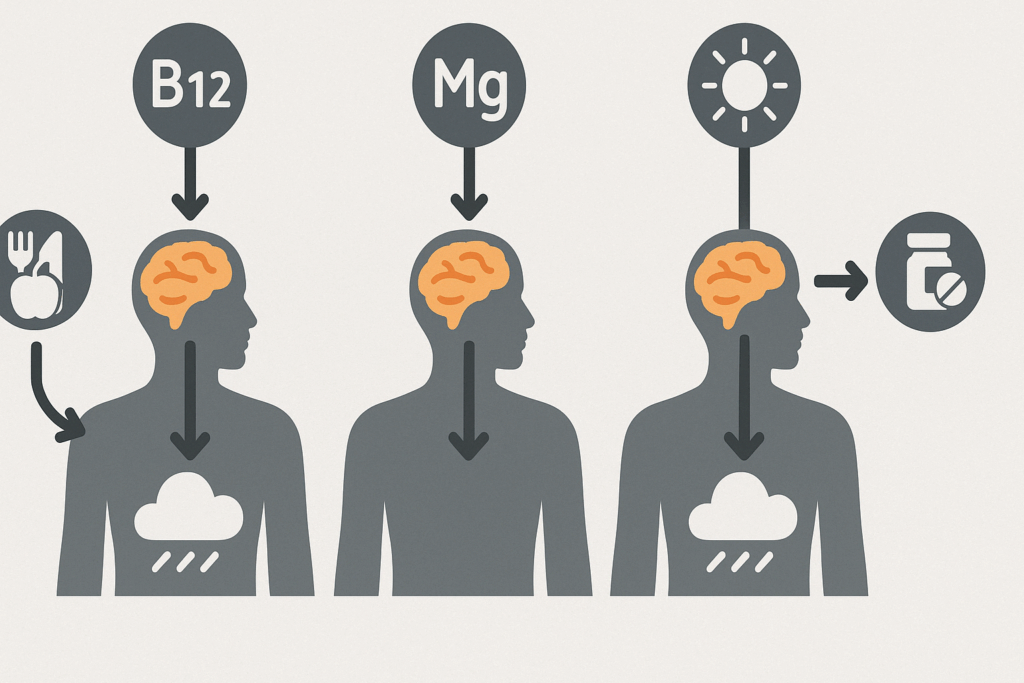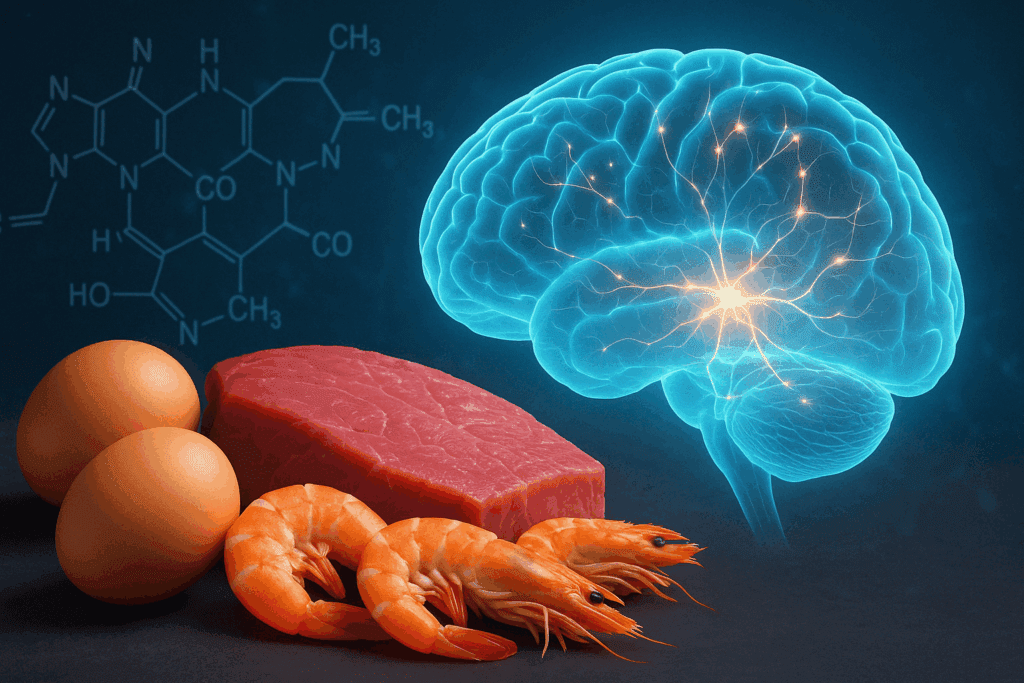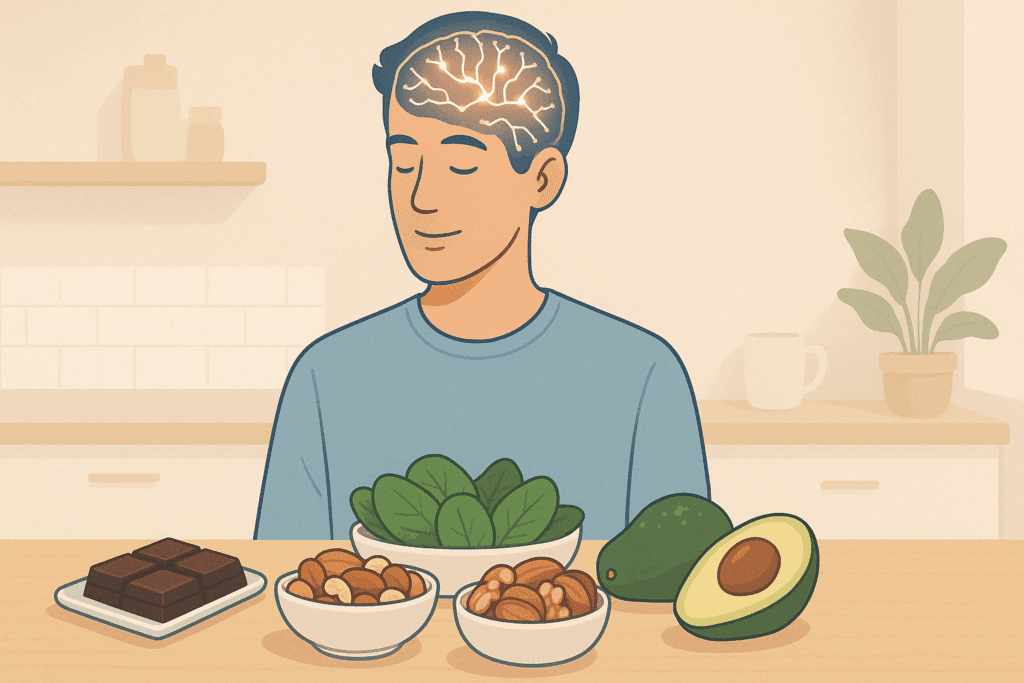For many, brain fog isn’t just a fleeting sensation—it’s an ongoing, frustrating experience marked by mental fatigue, forgetfulness, sluggish thinking, and a general sense of cognitive dullness. While it may not be a clinical diagnosis, brain fog is very real to those who live with it. The good news? A growing body of research points to a potentially reversible source: vitamin deficiencies. More specifically, scientists are increasingly exploring the links between low levels of vitamin B12, magnesium, and vitamin D, and the way they may contribute to mental cloudiness. If you’ve ever wondered, “Can vitamin deficiencies cause brain fog?”—or if you’re asking questions like, “Does B12 help with brain fog?” or “Can low vitamin D cause brain fog?”—this article provides a deep dive into the science behind these essential nutrients and their impact on mental clarity.
You may also like: How to Choose the Best Brain Supplements for Adults: Science-Backed Ingredients That Support Focus, Memory, and Mental Clarity
Understanding Brain Fog: What It Feels Like and Why It Happens
Brain fog is often described as a mental haziness that interferes with memory, focus, and decision-making. People experiencing it may find themselves rereading the same paragraph multiple times, forgetting basic tasks, or struggling to articulate thoughts clearly. While it can be caused by a variety of factors—including stress, poor sleep, hormonal imbalances, and chronic illness—nutritional deficiencies are often overlooked as contributing factors. The term “brain fog vitamin deficiency” has become increasingly relevant in medical literature, as low levels of certain vitamins have been shown to impact neurotransmitter production, nerve function, and cognitive speed.
The complexity of brain fog lies in its multifactorial origins. It’s not a singular condition with one cause but a symptom that can arise from a range of imbalances in the body. However, emerging evidence strongly supports the notion that when essential nutrients like vitamin B12, magnesium, or vitamin D are depleted, the brain’s performance begins to suffer. These nutrients are crucial for energy metabolism, nerve signaling, and inflammatory balance—all of which contribute to a clear, alert mind.

Vitamin B12 and Brain Fog: A Nutrient Central to Cognitive Function
Vitamin B12 is a water-soluble vitamin that plays a pivotal role in brain and nervous system health. It supports the production of neurotransmitters, maintains the protective myelin sheath around nerves, and aids in the synthesis of DNA. Given these critical functions, it’s not surprising that a deficiency in B12 can lead to cognitive impairments. In fact, one of the hallmark signs of vitamin B12 deficiency is neurological disruption, including memory problems, poor concentration, and yes—brain fog.
Multiple studies have confirmed the link between low B12 levels and cognitive decline, particularly in older adults. Yet the impact isn’t limited to the elderly. Young adults, vegans, vegetarians, and individuals with gastrointestinal conditions like Crohn’s disease or pernicious anemia are all at risk for insufficient B12 absorption. For these individuals, supplementing with B12 may offer noticeable improvements in mental clarity. Anecdotal and clinical evidence increasingly supports the idea that vitamin B12 and brain fog are intimately connected—prompting questions like, “Does B12 help with brain fog?” and “What’s the best vitamin B12 dosage for brain fog?”
Though B12 dosage needs can vary depending on the individual’s age, diet, and medical condition, typical therapeutic doses for brain fog range between 500 mcg to 2000 mcg per day, often in methylcobalamin form for better bioavailability. Importantly, B12 is generally safe even at high doses because it is water-soluble and excess amounts are excreted via urine. However, self-medicating without knowing your levels can be ineffective, so getting a blood test to determine your baseline is an important first step before supplementing.
Magnesium: The Silent Mineral Behind Cognitive Stability
Magnesium plays a surprisingly vast role in supporting the brain’s electrical activity. It’s involved in over 300 enzymatic reactions in the body and supports ATP production, neurotransmitter release, and synaptic plasticity—all of which contribute to cognitive health. Yet, magnesium deficiency is extremely common. Stress, caffeine, alcohol, and poor diet all deplete this critical mineral. As a result, many people experience symptoms like fatigue, anxiety, irritability, and brain fog without realizing the root cause may be a lack of magnesium.
Recent research has emphasized the role of magnesium in maintaining mental clarity. It stabilizes neural activity, reduces neuroinflammation, and helps regulate sleep patterns—all of which can reduce the intensity and frequency of brain fog episodes. The connection between magnesium and brain fog has become so well-recognized that health-conscious individuals often explore magnesium supplements as a natural solution to mental fatigue. But not all forms of magnesium are equal when it comes to cognitive function.
Magnesium L-threonate is the most brain-targeted form, as it crosses the blood-brain barrier effectively and has been shown to increase synaptic density in animal studies. Other forms, like magnesium glycinate and citrate, can also be helpful but may serve more general systemic purposes. For those wondering, “Does magnesium help with brain fog?” the answer, according to both anecdotal and scientific accounts, is yes—especially when paired with good hydration and sleep hygiene. At the same time, one must consider the flip side: can magnesium cause brain fog? In rare instances, excessive magnesium supplementation—especially in individuals with kidney problems—can lead to confusion and lethargy, although this is uncommon with normal dietary intake.

The Role of Vitamin D in Cognitive Function and Mental Clarity
Vitamin D has long been celebrated for its role in bone health, but more recent findings have spotlighted its significance in brain development, immune regulation, and neurotransmitter synthesis. The active form of vitamin D, calcitriol, functions like a neurosteroid, influencing a wide range of processes in the central nervous system. It’s involved in regulating mood, protecting neurons, and reducing oxidative stress—all of which are crucial for maintaining mental clarity and cognitive endurance.
A growing number of studies have linked low vitamin D levels with cognitive dysfunction, depression, and yes—brain fog. The question “Can vitamin D deficiency cause brain fog?” has been extensively investigated, and while causality is still being explored, the correlations are strong. Numerous patients with chronic fatigue, mood disorders, and attention difficulties have seen improvements in focus and energy levels following vitamin D supplementation, with some even claiming “vitamin D cured my brain fog.” While the term “cure” may be overstated, the improvements in mental clarity can be profound when deficiency is addressed.
Optimal vitamin D levels are generally considered to be between 40–60 ng/mL, though many people fall short due to inadequate sun exposure, darker skin pigmentation, or gastrointestinal conditions that impair fat absorption. If you’ve been feeling mentally sluggish and suspect low vitamin D, testing your serum 25(OH)D levels is essential. Supplementation with vitamin D3 (cholecalciferol) is often recommended at doses between 2000 IU to 5000 IU daily, depending on the severity of deficiency. Still, vitamin D is fat-soluble, and excessive intake without monitoring can cause toxicity. Thus, it’s wise to recheck blood levels after three months of consistent supplementation.
The phrase “vitamin D brain fog” has now become a prominent search term, reflecting the increasing awareness of this connection. For those dealing with seasonal affective disorder, autoimmune conditions, or general fatigue, correcting low vitamin D and brain fog often go hand in hand.

The Overlooked Nutrients: Beyond the Big Three
While vitamin B12, magnesium, and vitamin D take center stage in discussions about cognitive function, other nutrients deserve mention. For instance, vitamin C is often associated with immune health, but it also plays a role in neurotransmitter synthesis and antioxidant protection in the brain. Though the phrase “vitamin C brain fog” might not be as popular as its B12 or D counterparts, low levels of vitamin C can subtly impact cognition, particularly in individuals under chronic oxidative stress or with poor diets.
Folate (vitamin B9), choline, and omega-3 fatty acids also contribute to mental sharpness. Folate works synergistically with B12 to reduce homocysteine, an amino acid linked to neurodegeneration when elevated. Choline supports the production of acetylcholine, a key neurotransmitter for memory and attention. Meanwhile, omega-3 fatty acids support cell membrane fluidity and anti-inflammatory processes. These supporting nutrients further reinforce the idea that brain fog vitamin deficiency is rarely limited to a single nutrient—it’s often a multifaceted issue requiring a broad nutritional lens.
It’s also worth noting that not all supplements improve cognition. Some can actually impair it, especially when misused. “What supplements cause brain fog?” is an increasingly common question, particularly among biohackers and nootropic enthusiasts. Ironically, excessive use of certain herbal compounds or synthetic nootropics without balancing core micronutrient needs can backfire, leading to overstimulation, hormonal imbalances, or nutrient depletion that worsens mental performance.
Real-World Solutions for Nutrient-Based Brain Fog
If you suspect that your cognitive sluggishness is linked to a nutrient imbalance, the first step is diagnostic testing. Blood work can reveal levels of B12, magnesium (preferably red blood cell magnesium), and 25(OH)D. From there, tailored interventions can be designed. Rather than throwing a cocktail of supplements at the problem, targeted repletion based on data is far more effective.
Diet should be the foundation. Foods rich in vitamin B12 include eggs, dairy, shellfish, and organ meats. Magnesium can be found in leafy greens, nuts, seeds, and dark chocolate. Vitamin D remains elusive in food, with fatty fish and fortified dairy being modest sources—but regular, safe sun exposure remains one of the most effective ways to boost levels naturally. Supplementation may be necessary, but food-sourced nutrients tend to come with complementary compounds that enhance absorption and utilization.
In addition to dietary changes, lifestyle factors like reducing chronic stress, improving sleep quality, and maintaining hydration are essential for restoring mental clarity. These behaviors enhance the body’s ability to utilize vitamins efficiently and reduce the overall burden on the nervous system. Over time, this can reverse even persistent brain fog symptoms when nutrient deficiency is the root cause.

FAQ: Understanding the Link Between Vitamin Deficiencies and Brain Fog
1. Can vitamin B12 really clear brain fog, or is it just a placebo effect?
While anecdotal reports of “mental fog lifting” after B12 supplementation are common, clinical evidence also supports this. Vitamin B12 is essential for neurological health, particularly in synthesizing myelin—the protective sheath around nerve fibers. In cases of mild B12 deficiency, brain fog may develop slowly and subtly, affecting memory, processing speed, and focus. When the deficiency is corrected with the appropriate vitamin B12 dosage for brain fog, many patients experience improved clarity and mood stabilization. However, the degree of improvement often depends on how long the deficiency persisted and individual metabolic factors—so it’s far from being a mere placebo.
2. How much B12 should I take to help with brain fog, and can you take too much?
When considering the ideal vitamin B12 dosage for brain fog, it’s important to differentiate between dietary intake, oral supplements, and injections. For mild deficiency, daily oral doses ranging from 500 to 1,000 mcg are commonly used. However, the body absorbs only a fraction of this, especially if intrinsic factor levels (a gut protein required for B12 absorption) are low. While B12 is water-soluble and excess amounts are excreted through urine, unnecessarily high doses should still be approached with caution, especially in individuals with kidney issues. Consulting a healthcare provider ensures you’re targeting the root of the brain fog rather than overdosing without need.
3. Can low magnesium levels actually contribute to cognitive issues like brain fog?
Yes, low magnesium can impact neurotransmitter activity and energy production in the brain, contributing to mental fatigue and clouded thinking. Magnesium supports synaptic plasticity and GABA activity, which influence mood, learning, and attention. That’s why many functional medicine practitioners recommend addressing magnesium brain fog connections early in the diagnostic process. On the flip side, overuse of magnesium—especially from poorly absorbed forms like magnesium oxide—can occasionally lead to lethargy or paradoxical worsening of brain fog. So the key isn’t just magnesium use, but choosing the right form and dosage tailored to your needs.
4. Can magnesium supplements cause brain fog in some people?
Surprisingly, yes—though magnesium is generally brain-supportive, certain people may report increased grogginess or confusion after taking it, particularly if they’re already well-nourished or take forms with high laxative effects. This has led some researchers to ask: can magnesium cause brain fog when overused or poorly absorbed? While rare, too much magnesium can disturb electrolyte balance, especially if taken alongside calcium or potassium imbalances. This highlights the importance of personalized supplementation and regular monitoring—especially for those with renal issues or on diuretics.

5. Can low vitamin D levels lead to brain fog, and how does it manifest neurologically?
Low vitamin D and brain fog often go hand in hand, especially in individuals with autoimmune conditions, chronic fatigue, or mood disorders. Vitamin D receptors are widely distributed in brain regions responsible for executive function and memory, including the hippocampus. Research shows that vitamin D deficiency brain fog may mimic early cognitive decline, with symptoms like poor concentration, mental slowness, and even decision-making difficulties. So when patients say “vitamin D cured my brain fog,” it’s not hyperbole—restoring levels can literally revitalize mental clarity in some cases. But long-term neglect of this deficiency may result in more persistent cognitive dysfunction.
6. Which vitamin deficiency is most commonly linked to persistent brain fog?
While multiple nutrients play a role, the most frequently observed brain fog vitamin deficiency tends to be B12, followed closely by vitamin D and iron. However, asking “what deficiency causes brain fog” assumes a single root cause—which is rarely the case. Cognitive clarity depends on a well-balanced nutrient profile. Deficiencies in folate, vitamin C, magnesium, and omega-3s can also subtly contribute to sluggish cognition. Rather than chasing one isolated nutrient, it’s more effective to get a full micronutrient panel and treat the body as a system.
7. Could the supplements I’m taking be causing my brain fog instead of helping it?
Yes—paradoxically, people often overlook the fact that over-supplementation or inappropriate stacking can cloud mental function. If you’ve ever wondered “what supplements cause brain fog,” the answer might include iron (in excess), synthetic folic acid, or megadoses of fat-soluble vitamins like A or D. Some pre-workouts, energy boosters, and even multivitamins contain stimulants or artificial additives that can leave the brain overstimulated or burnt out. Always cross-reference your supplements with a functional medicine professional if you notice worsened clarity after starting a new routine.
8. Does vitamin C play a role in improving brain fog or mental fatigue?
Although less discussed, vitamin C is vital for synthesizing neurotransmitters like dopamine and norepinephrine. Emerging research shows that vitamin C and brain fog may be more connected than previously thought, especially under conditions of chronic stress or inflammation. Antioxidant depletion is common in neuroinflammatory states, and vitamin C helps counteract oxidative stress that impairs brain function. People with poor diets, smokers, or those under prolonged physical stress may especially benefit from optimizing vitamin C intake for sharper cognition and mood balance.
9. How does B12 interact with other vitamins when addressing brain fog?
When it comes to B12 and brain fog, synergy is everything. B12 works best when paired with folate and vitamin B6, forming the methylation triad that supports detoxification, neurotransmitter production, and homocysteine regulation. Low levels of any of these can impair B12’s ability to restore cognitive clarity. For example, someone supplementing B12 in isolation may still feel mentally sluggish if their folate levels are suboptimal. This is why many effective protocols combine vitamin B12 and brain fog remedies with broader B-complex support and individualized testing.
10. Is vitamin D supplementation always beneficial for brain fog, or are there risks?
While many success stories begin with “vitamin D cured my brain fog,” it’s not a magic bullet. High-dose vitamin D should be balanced with vitamin K2 and monitored calcium levels to prevent arterial calcification or imbalances. Some people—particularly those with certain genetic variants—may metabolize vitamin D less efficiently, meaning they need co-factors for activation. Also, the relationship between vitamin D brain fog relief and sunlight exposure is nuanced—circadian rhythm benefits from natural light may play just as large a role as serum levels. Always personalize your protocol and monitor labs regularly to avoid the downsides of megadosing.

Conclusion: Can Vitamin Deficiencies Cause Brain Fog? The Science Says Yes—But It’s Fixable
The science is becoming increasingly clear: when the body is deprived of essential vitamins like B12, magnesium, and vitamin D, the brain’s performance begins to falter. These deficiencies disrupt neurotransmitter function, reduce energy metabolism, and impair the immune and inflammatory systems in ways that manifest as cognitive dullness, forgetfulness, and impaired decision-making. In short, brain fog and vitamin deficiency often go hand in hand.
Correcting these imbalances can yield surprisingly fast and noticeable improvements in mental clarity, energy, and focus. Whether it’s through addressing low vitamin D and brain fog with targeted supplementation or restoring magnesium balance to stabilize mental function, the solutions are accessible and science-backed. Individuals often report that increasing vitamin B12 dosage for brain fog makes a dramatic difference in cognitive sharpness, while supplementing vitamin D cured their brain fog in what feels like a miraculous turnaround—though it’s simply the power of replenishing what the brain truly needs.
Ultimately, brain fog is not something to be ignored or accepted as a permanent part of life. By recognizing the role of nutrient deficiencies and understanding what deficiency causes brain fog in your specific case, you can take actionable steps to restore cognitive vitality. If you’re navigating the fog, testing your vitamin levels and strategically repleting B12, magnesium, and vitamin D may be the key to finding your way back to mental clarity.
Was this article helpful? Don’t let it stop with you. Share it right now with someone who needs to see it—whether it’s a friend, a colleague, or your whole network. And if staying ahead on this topic matters to you, subscribe to this publication for the most up-to-date information. You’ll get the latest insights delivered straight to you—no searching, no missing out.
Further Reading:
What Is The Best Vitamin For Brain Fog?


